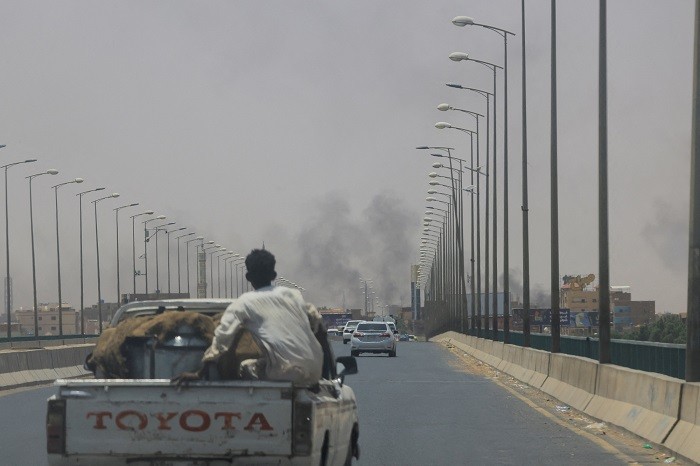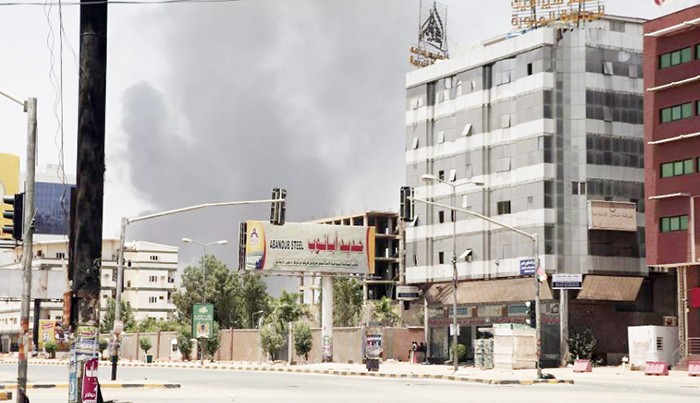(VOVWORLD) -In recent days, the world has been closely following political and security developments in Sudan, where the army and the paramilitary organization known as the Rapid Support Forces (RSF) are engaged in fierce fighting, which has killed about 100 people, including UN staff. Diplomatic efforts are being enhanced to call on involved parties to exercise restraint and create opportunities for dialogue to stabilize the situation.
 Smoke rises from a clash in Sudan on April 15, 2023. (Photo: Reuters) Smoke rises from a clash in Sudan on April 15, 2023. (Photo: Reuters) |
Tension that has been smoldering for months in Sudan heightened to clashes last Saturday between the army and the RSF across the country. RSF says it has taken control of the Presidential Palace, the residence of the commander-in-chief of the military, and airports. The Sudanese military denies those claims. What is happening in Sudan remains murky and it is not clear who is controlling the country.
The root the Sudanese civil war
The clashes have their roots in conflicts between the ruling factions. The Sudanese army and the RSF, who once were allies in a coup to seize power in 2019, now are firing on each other to vie for influence. The Sudanese army is loyal to General Abdel Fattah al-Burhan. The RSF is commanded by General Mohamed Hamdan Dagalo, known as Hemetti. In the military junta established after the coup, General Al-Burhan held the leadership position, while General Hemetti served as his deputy. Disagreement emerged recently over a plan to integrate the RSF into the regular army. The RSF wants the merging process to take 10 years, while the military wants it to finish in two years.
The RSF was formed in 2003 under former President Al-Bashir, with the founding forces being militias. In 2017 Al-Bashir put the RSF under the control of the military, but being an independent security force with its own command system.
The integration was part of a deal to bring civilian government back which was supported by Saudi Arabia, the UAE, the UN, and the US.
Disagreement arose between the two sides over who would be the commander-in-chief of the military during the multiyear integration period. The RSF said the commander should be the civilian head of state, an idea the army rejects. The conflict has delayed a final signing of a transition agreement originally scheduled for April 6.
 Black smoke rises after clashes in the capital Khartoum on April 15. (Photo: AP) Black smoke rises after clashes in the capital Khartoum on April 15. (Photo: AP) |
International community working to end conflict in Sudan
The situation in Sudan has raised concern in the international community. Neighboring Egypt and the Chad Republic have closed their borders with Sudan, and airlines in Egypt, Saudi Arabia, and Qatar have suspended flights to Sudan. The African Union (AU), the Arab League (AL), the Intergovernmental Authority on Development (IGAD), and the international community condemn the fighting and are calling on all parties to dialogue for a solution.
The UN Security Council convened a meeting in New York on Wednesday to discuss the Sudan situation. Emergency meetings were held calling parties to return to the negotiation table.
Both warring parties initially agreed to a UN proposal to open a humanitarian corridor for three hours a day. But that agreement is fragile and both sides have reserved the right to retaliate if the other violates it.
The Security and Peace Council of the African Union (AU) held an emergency meeting in Ethiopia on Sunday, calling on all parties in Sudan to exercise restraint and return to the dialogue table. The Council issued a statement opposing any outside intervention which could further complicate the situation in Sudan.
An emergency meeting of the Arab League, held the same day, urged all parties to immediately stop fighting. Several countries have expressed their wish to mediate.